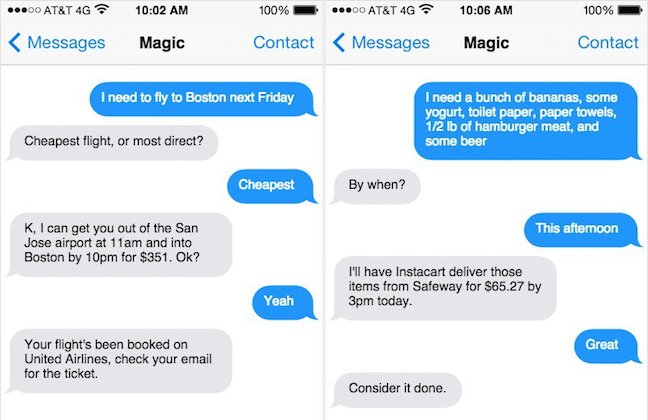
Text-to-Buy: Convenience Meets Personalization in Retail
The ‘text to get’ model is set to change the way we shop. It’s simple; send a text of what you want and when you want it. An associate will confirm your order and it’s on its way. Great examples include Melbourne based Three Thousand Thieves, a subscription coffee service and New York based Stefan’s head, a ‘concierge of cool’ of sorts, where users register their interest to receive limited edition and exclusive clothing offers.
So what might an order look like? Here are some examples from the Three Thousand Thieves site:
“I'm out of coffee. I need 500 grams of beans sent to Surry Hills, and by God I need them now."
Or this …
"Hey can you send my girlfriend an Aeropress as a gift from me, and do it by tomorrow?"
Texting is native behaviour, the barriers to use are very low, and with virtually no learning curve it removes a step in the buying process - no need to checkout, once your payment details are on file someone does it for you.
Traditional mobile commerce requires steps like address inputs, validation and payment rules, all of which can be barriers to purchase, increasing the likelihood of cart abandonment.
The very act of sending a text message suggests a personal interaction, where a brand can reply directly and openly. It’s easy for an associate to clarify an ambiguous order or solve a customer problem. and texting takes away the frustration that may arise by being unable to proceed to checkout due to a bug or other breakdowns on an ecommerce site.
Texting might even further actualize as a personal connection to a particular store. Could it become the norm to text your local department store to say “Hi, I’m looking for some blue jeans that I can wear in Summer, so nothing too heavy, thinking of spending around $150, suggestions?”. An associate might then reply with four different options and offer to send the favourite option home within a few hours for you to try.
‘Magic’ is an SMS powered concierge shopping service that launched in February, the startup promises to deliver any product or service by texting the Magic number (83489 for those interested) -- with no app download required! In its first three days after launch, Magic accumulated over 1000 customers and delivered on 1700+ requests, ranging from ordering take-out Indian food to booking flights.

Above: Sample orders from the Magic number
‘Operator’ is a similar app created by Uber co-founder Garrett Camp. Camp claims Operator is his next big idea and his goal is to blend navigation of the physical and digital worlds. “It’s like Siri, but with a real person on the other end” says Camp. To be launched soon, Operator takes aim at e-commerce giants Amazon and Ebay by offering a more personalised, message based concierge shopping service. App users will send a message or image in the app, that will connect shoppers to stores that stock items of interest. Associates then respond with product information, prices and images. Beyond this, shoppers can follow individual ‘Operators’ or use the discover feature to browse products that suit their style.
Increasingly, shoppers are outsourcing the traditional path to purchase, opting to have machines and other people do the researching and purchasing of the products and services they consume. One thing's for sure: the way we buy is constantly evolving.
Text based offerings bring new meaning to ‘anytime, anywhere’ convenience. Will this become the preferred channel for customers to shop? How is your company preparing for this new wave of customer interaction?
EDITOR'S NOTE
Since publishing date:
- Nordstrom has released their TextStyle shopping service, allowing shoppers to connect with stylists via text message. The initiative began based on Nordstrom's customer research, where they learned that text is the preferred way to be contacted for a third of their customers.
- GoButler has taken its SMS based personal assistant out of beta to operate in the United Kingdom, United States, Canada, Switzerland, Austria and Germany. It has also raised $8M in funding.
Disclaimer: The statements and opinions expressed in this article are those of the author(s) and do not necessarily reflect the positions of Thoughtworks.














